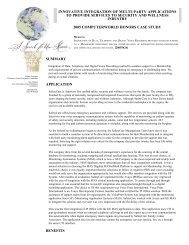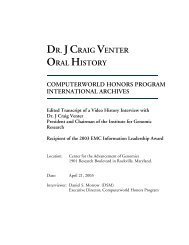NATHAN MYHRVOLD PhD ORAL HISTORY - The Computerworld ...
NATHAN MYHRVOLD PhD ORAL HISTORY - The Computerworld ...
NATHAN MYHRVOLD PhD ORAL HISTORY - The Computerworld ...
You also want an ePaper? Increase the reach of your titles
YUMPU automatically turns print PDFs into web optimized ePapers that Google loves.
Today when we recruit someone for Microsoft research, we have lots of things to<br />
say. We can say, look at all the great people we have here. In many areas, we have<br />
some of the best groups in the world working at Microsoft Research. Computer<br />
graphics is a stealer line of both young, up and coming people, and many of the<br />
masters of the field. That is true in area after area. We can point at lots of other<br />
things, but our most powerful one is still this notion that if you come here, you can<br />
really affect peoples’ lives. That matters a lot to folks.<br />
That brings me to the second risk. Suppose we do great research, are we going to<br />
see any of it in products? I argued yes on a couple of basis. <strong>The</strong> first is, these stories<br />
about Xerox PARC and other things are just silly. <strong>The</strong>y don’t give Xerox or Bell<br />
Labs or IBM the credit they deserve in a variety of ways. <strong>The</strong> first is that people do<br />
dumb things. <strong>The</strong>re are mergers, disastrous mergers, but because a company does a<br />
disastrous merger, does that mean every company doesn’t do it? People have<br />
disastrous ad campaigns, does that mean everyone stops? No, but for an odd reason,<br />
if you have one example of a failure in research, everyone says, “Oh, you shouldn’t<br />
do it.” Well, mistakes were made at some research organizations. That doesn’t<br />
mean you shouldn’t do it. In fact if you look at the next level, you discover that a lot<br />
of companies do research that they have no business doing literally. <strong>The</strong>y do<br />
research outside their area of business. If you look at Xerox PARC, Xerox invented<br />
the Laser printer there. In fact the guy who invented the Laser printer now works at<br />
Microsoft. So I’ve heard all the early stories about this. <strong>The</strong> Laser printer made<br />
billions of dollars for Xerox. It more than paid for Xerox PARC a zillion times over.<br />
So Xerox PARC was actually one of the best investments the Xerox Corporation ever<br />
made, and people who make fun of it are just being ridiculous. <strong>The</strong> Laser printer<br />
succeeded because it was similar enough to the core business of Xerox. <strong>The</strong>y<br />
understood how to make it. It’s been on the same assembly lines as those they made<br />
their copiers on. <strong>The</strong>y understood how to sell it. <strong>The</strong> sales force could do<br />
something with it. It integrated in their package as a company. It was useful to<br />
them.<br />
Xerox PARC also invented personal computing, and people make fun of them for<br />
not commercializing it. It’s very hard to commercialize something that is widely<br />
outside your own scope. It also turns out that they did a merger. <strong>The</strong>y acquired a<br />
company in the 1970s that I think they paid almost a billion dollars for, and wrote<br />
the whole thing off. It was a disaster. If you’re going to beat up on Xerox, beat them<br />
up on that. It costs five times what PARC costs them, but nobody thinks of that.<br />
Instead they want to make fun. PARC was a great thing for Xerox. It’s true that<br />
they invented a spectacular technology, but they didn’t manage to commercialize it.<br />
Nathan Myhrvold<br />
Oral History<br />
32









